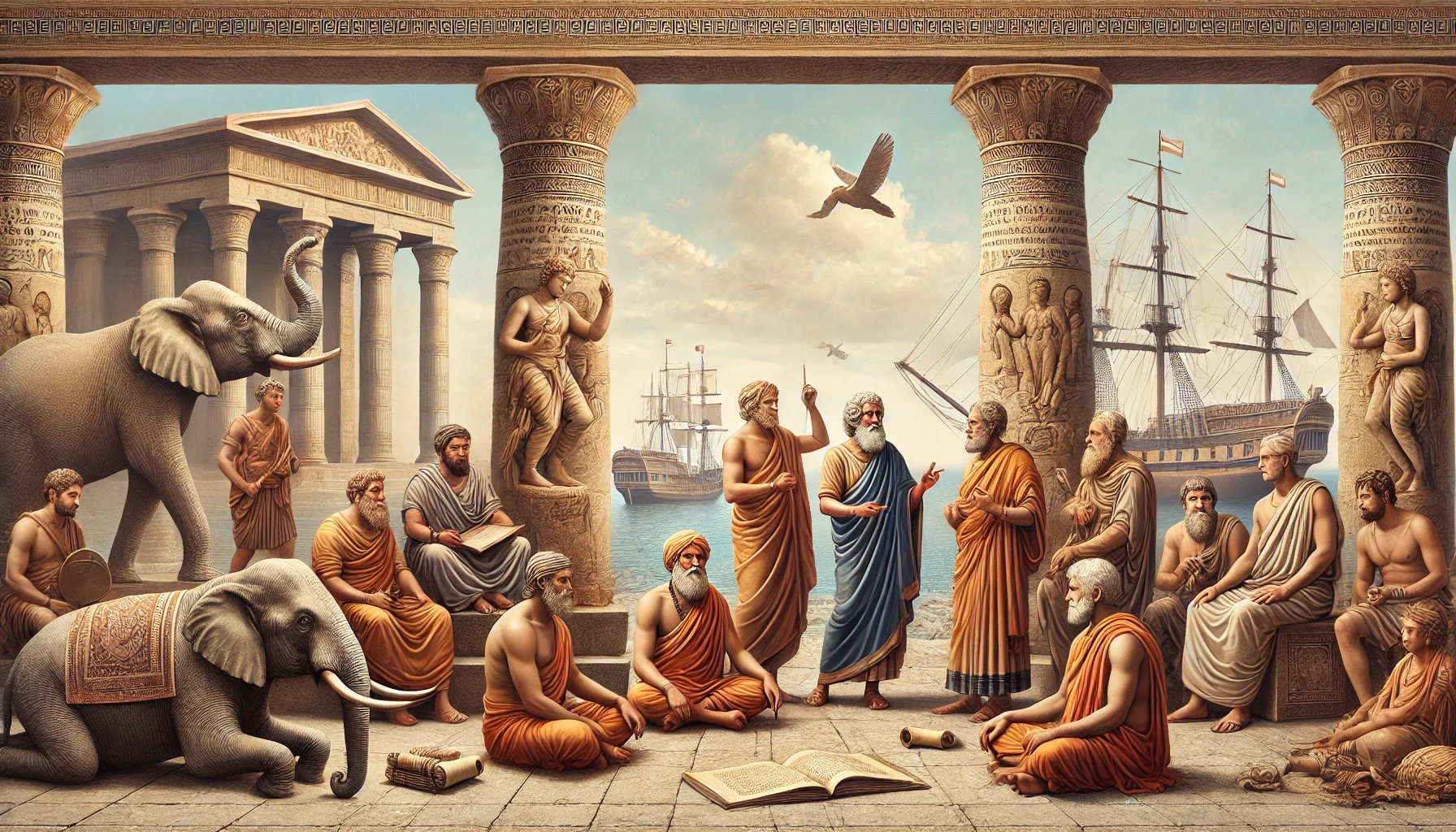Ancient India and Western Development
by Beezone

Summary
This essay explores the potential connections between ancient Indian, Egyptian, Jewish, and Greek cultures, suggesting that India’s influence on Western civilization may be deeper than typically acknowledged. Historical accounts, such as those by Josephus, hint at an exchange of ideas, with Jewish and Greek philosophers possibly drawing from Indian thought. Indian scholars and traders were present in Alexandria, influencing Greek intellectual circles. British and German historians, including Sir William Jones, Peter Von Bohlen, and Heinrich Karl Brugsch, proposed that India’s advanced culture influenced Egypt and that Egypt’s origins may trace back to Punt, near the Indian Ocean. Such connections, often overlooked by Western historians, suggest that India’s philosophical and cultural heritage may have contributed significantly to the foundations of Western thought. This view urges a re-examination of ancient history to recognize India’s role as a vital source of early intellectual exchange.
India the Mountain End – Adi Da Samraj
The idea that Jewish philosophy and culture may have connections to Indian traditions is fascinating and complex, intertwined with historical cross-currents involving India, Egypt, and the Mediterranean. While mainstream historical accounts have often omitted or minimized the notion that ancient Indian culture significantly influenced Western civilization, a growing body of research points toward such connections, particularly as early as the period of Alexander the Great’s campaigns in India around 327 BCE. However, connections likely extend further back, suggesting a deeper, older tradition of cultural exchange that may have shaped not only the Greco-Roman world but also Judeo-Christian thought.
Before Alexander’s conquest, evidence of cultural and intellectual exchange existed between India and the Mediterranean through indirect and, at times, direct routes via Mesopotamia and Egypt. According to the Skandha Purana, an ancient Indian text, Egypt was part of a region referred to as Sancha-Dvipa, highlighting an Indian awareness of Egypt as early as recorded history allows. The work of British Orientalist Sir William Jones suggests that Egypt and India had a recognized relationship in ancient records. He noted that Indian scholars and traders were common in Alexandria, Egypt, even as late as the first and second centuries CE, as Chrysostomus and Clement of Alexandria mentioned.
This possibility of early and sustained exchange is also supported by various European historians and Indologists, including Peter Von Bohlen and Klaus Klostermaier. Von Bohlen, a German Indologist, argued that India and ancient Egypt shared cultural ties and intellectual roots. Klostermaier further noted the presence of bustling trade routes between India and the Mediterranean, with Indian goods and ideas flowing through the ports of Sopara and Muziris, known for their connections to Egypt and later Rome. Muziris, located in modern-day Kerala, allegedly engaged in trade with Egypt during Queen Hatshepsut’s reign and with Israel during King Solomon’s rule, reflecting a longstanding history of Indo-Mediterranean interactions.
These connections weren’t solely economic; they included the exchange of philosophies and ideas. The presence of Indian sages and scholars in Alexandria, often mentioned alongside Greek philosophers, suggests a cross-pollination of ideas that could have influenced Western thought. The Jewish historian Josephus, for instance, presents the image of a Jewish philosopher conversing with Greek philosophers, reflecting respect for Jewish and possibly Indian-influenced thought among the Greek intellectual elite. Clearchus, Aristotle’s student, recounted that Aristotle himself engaged in philosophical dialogue with a Jewish man from Celesyria, who possessed wisdom, discipline, and intellectual depth that fascinated Aristotle. Some scholars theorize that Jewish thought may have absorbed influences from Indian philosophy through such intercultural exchanges.
Beyond the Alexandrian period, British Lt. Colonel Wilford, in his essay On Egypt from the Ancient Book of the Hindus, claimed that ancient Indians had colonized and influenced Egypt itself. He argued that Indian settlers introduced their knowledge and civilizational achievements to Egypt, a view echoed by British explorer John Hanning Speke. Speke, who traced the Nile’s source to Lake Victoria, noted that Egyptians lacked knowledge of their own river’s origins, while the ancient Hindu texts seemed to reference Egyptian geography with an accuracy that led Speke to Ripon Falls, on the Nile’s true source.
The German historian Heinrich Karl Brugsch further expanded on this theory, stating in his History of Egypt that India may have sent emigrants to Egypt as early as eight thousand years ago, introducing advanced arts and sciences. The Egyptian records themselves recount that their ancestors came from a sacred land near the Indian Ocean, known as Punt, considered the “Land of the Gods” or Pa-Nuter. Egyptian deities such as Amon, Horus, and Hathor were believed to have come from Punt, thus symbolizing a mythological or actual migration from the East to the Nile Valley.
This narrative of Punt as a Holy Land bears an intriguing resemblance to ancient Indian cosmology, which reveres India as the land of the sages and gods. Such myths provide a striking parallel, suggesting that Egypt’s religious roots might trace back to the Indian subcontinent. Western historians have often been skeptical of these connections, perhaps due to the fragmentary nature of evidence or the challenge of reconciling them with more established historical frameworks. Yet, the rich tapestry of oral traditions, textual references, and archaeological traces paints a picture of ancient, transcontinental exchanges that likely influenced early Jewish, Greek, and Egyptian cultures.
While definitive proof of Indian influence on Western culture remains elusive, these historical connections open a compelling line of inquiry. They suggest that India’s philosophical and cultural contributions may have been a foundational element in the ancient world, helping to shape the intellectual traditions that would later emerge in the West. If true, it implies that Western civilization’s roots may be more interconnected with Eastern traditions than commonly acknowledged, calling for a reevaluation of cultural history that places India not just as a participant in ancient trade but as a possible source of the West’s intellectual heritage.
Further reading: